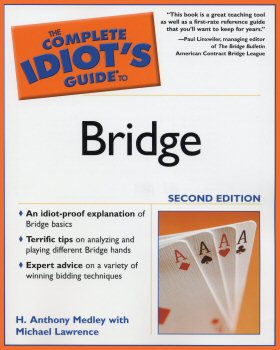| The first edition of Complete Idiot's Guide to Bridge by H. Anthony Medley was the fastest selling beginning bridge book, going through more than 10 printings. This updated Second Edition includes some modern advanced bidding systems and conventions, like Two over One, a system used by many modern tournament players, Roman Key Card Blackwood, New Minor Forcing, Reverse Drury, Forcing No Trump, and others. Also included is a detailed Guide to Bids and Responses, along with the most detailed, 12-page Glossary ever published, as well as examples to make learning the game even easier. Click book to order. | ||
|
Fair Game (7/10) by Tony Medley Run Time 106 Minutes OK for children. Too bad there is not an antonym for roman á clef, because that’s what would fit this perfectly. Instead of a story in which actual persons, places, or events are depicted in fictional guise using fictional names, this uses real names and real people and fictionalizes them. As a political thriller, this is a rip-snorter. The problem is that it is based on fact, the Valerie Plame/Joe Wilson/Scooter Libby incident during the Bush Administration and the run-up to and aftermath of the Iraq war. In a nutshell, Plame (Naomi Watts) worked for the CIA. Her husband, Wilson (Sean Penn), was sent on a fact-finding mission to Africa to determine if Iraq was trying to buy Uranium. He concluded they weren’t. President Bush subsequently made a speech to Congress and said that the British reported that Iraq was trying to buy uranium in Africa. Wilson was incensed that his opinion was ignored and wrote an op-ed piece for the New York Times debunking what Bush said. Then it was The White House’s turn to be incensed. To discredit Wilson, it had a State Department employee, Richard Armitage, leak to journalist Robert Novak that Wilson was Plame’s husband and that she worked for the CIA, thereby outing a secret agent. Thus a huge war developed between The White House on one side, and Valerie Plame and Joe Wilson on the other. However, one thing I never understood about Wilson’s article is that Bush’s statement in the State of the Union address said that the British reported that Iraq was trying to buy uranium, not that it was a fact. What Bush said was not untrue if the British did, in fact, report that. Bush didn’t make the statement that Iraq was buying it, just that the British reported that they were buying it. There is a standard disclaimer that the film, written by Jez Butterworth and John-Henry Butterworth, is “based on” the books Fair Game by Plame and The politics of Truth by Wilson, but that fictional characters and events have been added. This disclaimer allows them to get away with murder and have everyone walk away believing it as gospel. In fact, what the disclaimer says is, “Any similarity of those fictitious characters, incidents or companies to the name, attributes or actual background of any actual person, living or dead, or to any actual event, or to any existing company, is entirely coincidental and unintentional.” In other words, a lot of this is pure fiction. And the part that is pure fiction is the part that establishes Plame as a James Bondish secret agent. Clearly she didn’t do what’s in this movie. But what did she do? Nobody will ever know because it’s classified and it would be a felony for her to talk about it. Director Doug Liman (who doubled as Director of Photography) does a masterful job of creating and maintaining tension, aided immeasurably by a stellar performance by Naomi Watts as Plame and a terrific score by John Powell. I really wanted to believe that what I was seeing was the truth and that what Plame is shown doing here is equivalent to what she actually did. But that requires that I trust the filmmakers. Liman’s father, Arthur, was counsel for the Democrat-controlled Senate in the Iran-Contra hearings, circa 1986-88, which puts him on the left. Penn, who pals around with Venezuela’s virulently anti-American dictatorial President Hugo Chávez, comes about his leftwing leanings naturally as the son of Leo Penn, who is lionized by the left as one of those blacklisted for refusing to name names before the House Unamerican Activities Committee (HUAC). The movie shows what it’s like for two individuals to take on The White House; two individuals facing the vast power and money of the federal government, clearly a daunting task. If you take what Plame was doing as fictionalized fact, you can’t help coming out of the movie with a Point of View. My personal feeling is that there is probably a lot of fire behind this smoke and that Plame and Wilson might not have been the ideological zealots painted by The White House, but people who were just speaking the truth as they knew it. If so, they were seriously injured by the Bush White House. So I tried to ignore the political bias of two leftwing filmmakers, Penn and Liman, and enjoyed the film as a good fictional political thriller loosely based on fact with fine performances by Watts and Penn (although Sean still can’t cry tears on cue). But I came out of it wondering how close it really was to the truth. Knowing how dirty politics and politicians are, it wouldn’t surprise me if it were close to the truth. October 27, 2010
|
||
